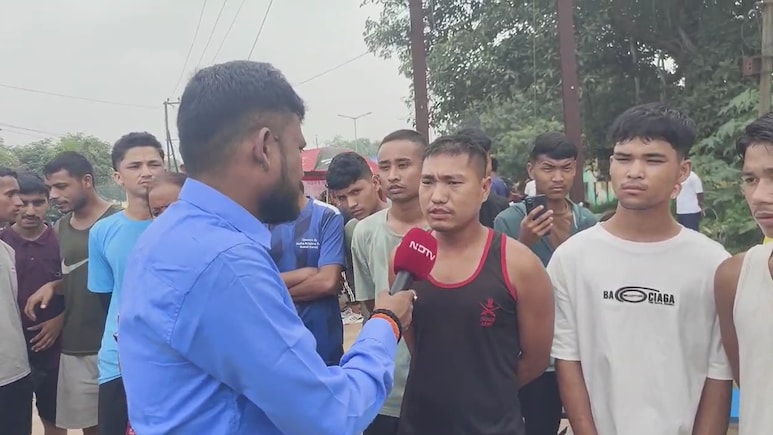
- Around 3,000 Nepalese have gathered in Odisha seeking 135 government job vacancies
- Unemployment in Nepal is chronic, especially among youth, prompting many to seek work abroad
- Protests erupted after Nepal's government banned social media, leading to violent demonstrations
Far from the smoke and barricades of Kathmandu, around 3,000 Nepalese have gathered in Odisha's Jharsuguda, seeking scarce opportunities for government employment. At the same time, their homeland is convulsed by some of the most dramatic protests in its recent history -- young demonstrators setting ablaze government buildings, storming institutions, and forcing the resignation of Prime Minister KP Sharma Oli after days of anti-corruption unrest.
While Nepal's 'Gen-Z' light fires of dissent in Kathmandu, their compatriots 900 kilometres away stand quietly in queues outside the Odisha Special Armed Police 2nd Battalion headquarters, hoping to secure one of just 135 advertised posts -- vacancies open only to Nepali girls and Indian Gurkhas.
"No Job, No Income"
"No job, no income -- we are bound to come," said one Nepalese man to NDTV. For many, the path to India was not a choice but an outcome of limited options at home.
"Nepal's young generation is all going abroad to work and earn their livelihood. The Nepalese government should have paid attention to the young generation. But they didn't pay attention to that," a Nepalese man told NDTV.
Unemployment in Nepal has long been a chronic problem, disproportionately affecting its youth. Many families rely on remittances from abroad. But frustration has intensified, particularly among those born after the 1990s, a generation that has grown up amid frequent political upheaval yet with little improvement in livelihoods.
It is this same generation that has filled Nepal's streets in recent weeks.
"There is a lot of corruption and unemployment. We have come all the way to Odisha because of unemployment. We have been here for six days. There is a lot of unemployment there. The children of the leaders there are studying abroad. Those who have money and power are the only ones who are getting jobs," said another Nepalese, speaking with NDTV.
Kathmandu in Flames
Protests erupted after the Oli government imposed a ban on several social media platforms, citing security concerns. When the ban was imposed, anger spilt into the open. Demonstrators set fire to the Supreme Court, Rashtrapati Bhavan, and other state buildings. Crowds broke into Nakhu Jail to release former Deputy Prime Minister Rabi Lamichhane, a populist figure and leader of the Rastriya Swatantra Party, who had been awaiting trial on charges of financial misconduct.
"Our Prime Minister (KP Sharma Oli) could never do his job. That's why the youth threw him out. In this generation, we need a leader who doesn't just say words. Everyone can speak, we need action," said another Nepalese job aspirant.
By Tuesday evening, at least 19 people had been killed in clashes between protesters and security forces. The mounting casualties and the growing spread of demonstrations across cities left Prime Minister Oli with little choice but to resign.
The Constitutional Question
Nepal now faces an urgent constitutional test. Under its 2015 charter, the president must appoint a successor from the party with a majority in parliament. If no party commands such a majority, a member capable of securing confidence in the house must be appointed, with a 30-day deadline to prove support.
Failing that, the constitution allows for parliament's dissolution and fresh elections.
But protesters remain sceptical of established parties. Many of their leaders are either in hiding or have been discredited in the eyes of the youth.
Former Supreme Court judge Balaram KC has urged the demonstrators to form a negotiation team, while also calling on President Ram Chandra Poudel to include civil society and the army in talks. Others, like constitutional expert Bipin Adhikari, argue that an interim government, though extra-constitutional, may be necessary to bridge the gap between protesters and the state.
(With inputs from Dev Kumar Ghosh)
Track Latest News Live on NDTV.com and get news updates from India and around the world

